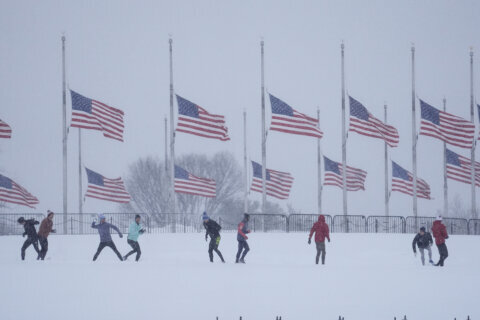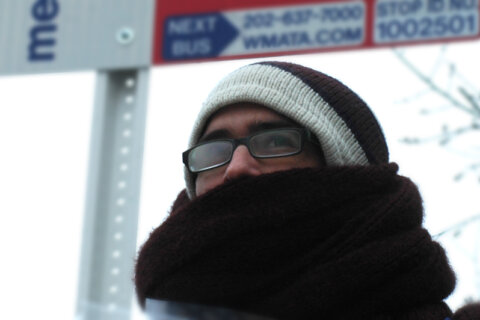On a frigid Wednesday night in D.C. where it felt like temperatures were dipping into the teens, Ted Joseph, a case worker for D.C.’s Department of Human Services, visited several spots where tent encampments are setup.
“We’re trying to get these individuals into a safe, comfortable location and out of the cold,” Joseph said.
In his van, he packed up hats, scarves, hand warmers, and blankets to hand out to those who choose not to go to a shelter. The first stop was on Massachusetts Avenue in Northwest, where he walked up to each tent and attempted to get the attention of those inside.
At one tent, a man answered. Joseph told the man about the shelter options the man has to escape the cold, but in the end, he declined the invitation but accepted blankets and handwarmers.
“We have beds at several low-barrier shelters and hypothermia sites, so anyone who needs a bed can get a bed,” Joseph said. “But at the end of the day, we cannot force anybody to take any of our resources.”
After stopping at several tents and not receiving a response from anyone inside, it was off to the next stop.
“They could be in a shelter, they could be at work, could be out, just doing a number of different things,” Joseph said.
According to the department, there has been an increase in people going to shelters since this week’s snowfall, though not all choose to go to a shelter. More than 1,500 beds are being used, with approximately 140 still available. During cold emergencies the city also has access to additional locations to make sure everyone who wants inside, has an option.
Joseph said the hope, especially on cold nights, is that people agree to going to a shelter. If they do want transportation to a shelter, Joseph would call the shelter hotline and request a pickup.
The next stop was a bench outside the U Street Metro station, where a man who is known to DHS as someone who turns down assistance can usually be found. While his bags of belongings occupy the bench under a bus stop canopy, he couldn’t be found after searching the area, including inside the Metro station.
“Hopefully he went in and is now occupying one of our shelter beds,” Joseph said.
In addition to their immediate needs, Joseph said he and the other caseworkers who hit the streets hope to start a person on a path that gets them off the streets.
“We try our best to get them resources and services to make sure that we can get, or we can end this experience of homelessness,” he said.
Also in the van was a box of Narcan, which is used to reverse an opioid overdose. Joseph said those can be handed out as well, and he and his colleagues have been trained on how to administer the medicine.
“I’ve had to administer Narcan several times. It’s not fun,” Joseph said.
The final stop was the Brentwood neighborhood, on 9th and T streets, across from the site where BET Network’s headquarters sat for many years. In one of three tents was lifelong D.C. resident Charles Williams, who has been experiencing homelessness for 13 years.
He accepted the blankets, handwarmers and scarves, but said shelters were not for him.
“I got an attitude problem. If I’m being bullied or somebody takes something from me, I don’t think, I react,” he said.
Williams said over the years, he’s learned how to survive the cold weather inside a tent.
“I got my portable heater, I manage. It’s tough, but I manage,” he said.
Williams said while he is thankful for the offering of supplies and help to a shelter, he has been on a waitlist for housing and hopes that will finally come through.
“All I can do is pray, my brother,” Williams said.
Joseph said the Department of Human Services’ teams will continue to go out nightly to check on those who chose to stay outdoors. During the extreme cold, he encourages people to check on their neighbors who may be experiencing homelessness.
“Ask that individual if they need any assistance, or if they’d like you to contact 311, to get the shelter hotline, to provide transportation to one of our many hypothermia shelters,” Joseph said.
DHS doesn’t work alone, according to Joseph, who said many other organizations also check on individuals who may be living on the streets.
In addition to helping with the immediate needs of those experiencing homelessness, Joseph said caseworkers and partner organizations who hit the streets hope to ultimately start a person on a path that gets them off the streets.
“We’re all out here. Just want to make sure that everyone is safe and everyone is warm,” Joseph said.
Get breaking news and daily headlines delivered to your email inbox by signing up here.
© 2025 WTOP. All Rights Reserved. This website is not intended for users located within the European Economic Area.







